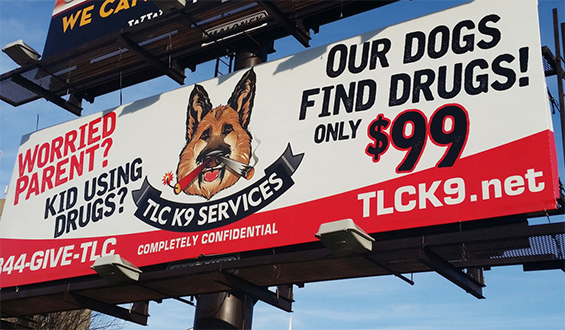
Kentucky parents have begun to use a private K9 company to search their teen’s rooms for drugs.
Michael Davis opened the business, Last Chance K9 Service, last September. He said that since that time, his firm has searched the homes of over 50 families in the Louisville area.
Davis told Peter Holley of The Washington Post that nine out of ten times, drugs are found by the dogs. Most commonly discovered so far is heroin, although cocaine, marijuana, methamphetamines and barbiturates have also been found, sometimes in very discreet hiding places throughout the home or in a car.
The area has seen an increase in the use of heroin lately, with 204 overdose deaths being reported in Jefferson County in 2014. That number is 192 higher than it was the year before, according to data from the Kentucky Office for Drug Control Policy.
Davis said the high drug use has created a steady flow of work for his dogs, who are also hired out to uncover bombs, firearms, and drugs for businesses and private clients. He added that work began as soon as the billboards were in place, which feature a German Shepard with a stick of dynamite in one nostril and a joint in the other. The advertisement reads “Our dogs find drugs!”
“We had a lot of parents who said, ‘I don’t know what my child is doing, but I remember what I was doing at that age. Would you go through my child’s room just so I could have security?’” Davis told The Post. “We’ve done a lot of those homes and many came up with drugs and the parents were shocked.”
“Other times,” Davis added, “we didn’t find drugs and then we encouraged the parents to give their kids positive reinforcement.”
However, Lawrence Balter, a professor of applied psychology at New York University, who has authored numerous parenting books, said parents who seek out such methods may find it difficult to maintain a positive relationship with their children, who could feel they are being put under surveillance. Balter went on to say that teens will only become even more secretive when they feel they are being spied on.
While Balter did admit a drug-sniffing dog could be useful in extreme cases, such as a student who has been placed on probation or is on the verge of getting themselves into serious trouble, he added that it would be more useful for parents to work on creating the type of relationship with their children that allows them to candidly discuss the subject of drug use.
Davis, meanwhile, said that many families who employ his services feel that taking such action is better than their child winding up in jail. If drugs are found in the home, he makes the offer to “scare teenagers straight” through the creation of a conversation between parents and their children.
While some parents prefer their child to be at school when the search is performed, others, Davis said, ask him to create a “show of force” while they watch.




